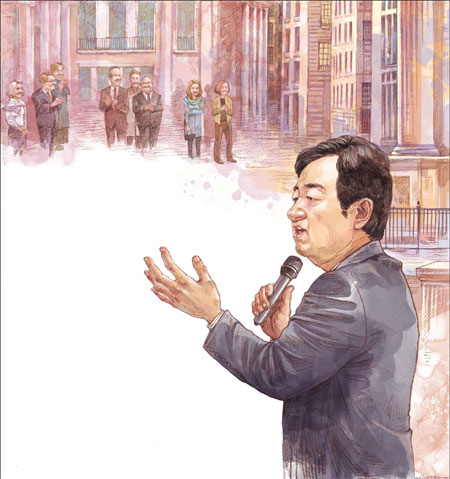Finding their political voice
Updated: 2012-02-10 10:26
By David Bartram (China Daily European Weekly)
|
|||||||||
 |
An increasingly self-confident Chinese community is being encouraged to join politics
Europe's Chinese diaspora is being urged to take a more active role in politics as immigrant communities across the continent begin to find their political voice. As more Chinese immigrants, particularly second- and third-generation, begin to engage with mainstream national politics, governments are looking for ways to better integrate the community.
|
||||
The UK's Electoral Commission is one such body to take steps to encourage British-Chinese to engage with the political process. It recently launched a new campaign, based around Chinese New Year, encouraging the community to vote in upcoming local and regional elections.
Of the estimated 650,000 people that make up the UK's British-Chinese community, some 30 percent are not on the electoral register.
"The dragon is said to symbolize decisiveness and passion," says Samantha Mill, head of campaigns at the Electoral Commission. "Making the decision to register to vote is one way that members of Chinese communities across the UK can make their voices heard on the issues they are passionate about."
That the issue is beginning to attract the attention of bodies such as the Electoral Commission is evidence of the work being done to correct the widespread under-representation of Chinese communities across Europe's political institutions.
"There is this idea that Chinese immigrants are not interested in politics," says Joseph Wu, who works with the BC Project, an organization that promotes the integration of British-Chinese into politics. "It is said that they have an emotional coldness toward politics, but I think this is a very stereotypical idea.
"From my experience I've found that if people feel that their voice is valued, they will communicate very passionately. Some people like to label the Chinese community as the 'silent community' but phrases like that are very dangerous.
"It implies the silence is something innate, when in reality it is the result of a very particular set of circumstances."
The BC Project is taking steps to alter these circumstances. Since being founded in 2006, it has attracted sponsorship from members of parliament and built a network of contacts designed not only to encourage British-Chinese to vote, but also support those who wish to play an active role in UK politics themselves.
However, the biggest challenge remains in convincing the Chinese community that politics is relevant to their lives.
"The traditional reaction of the Chinese community has been to say: 'We are here as guests, so we must adapt if anything changes.' But unfortunately every so often an issue arises that requires the community to express a view," says Wu.
One such example was a piece of immigration legislation proposed by the previous Labour government, which would have placed a strict English-language requirement on immigrant workers. The Chinese catering industry would have been particularly affected.














